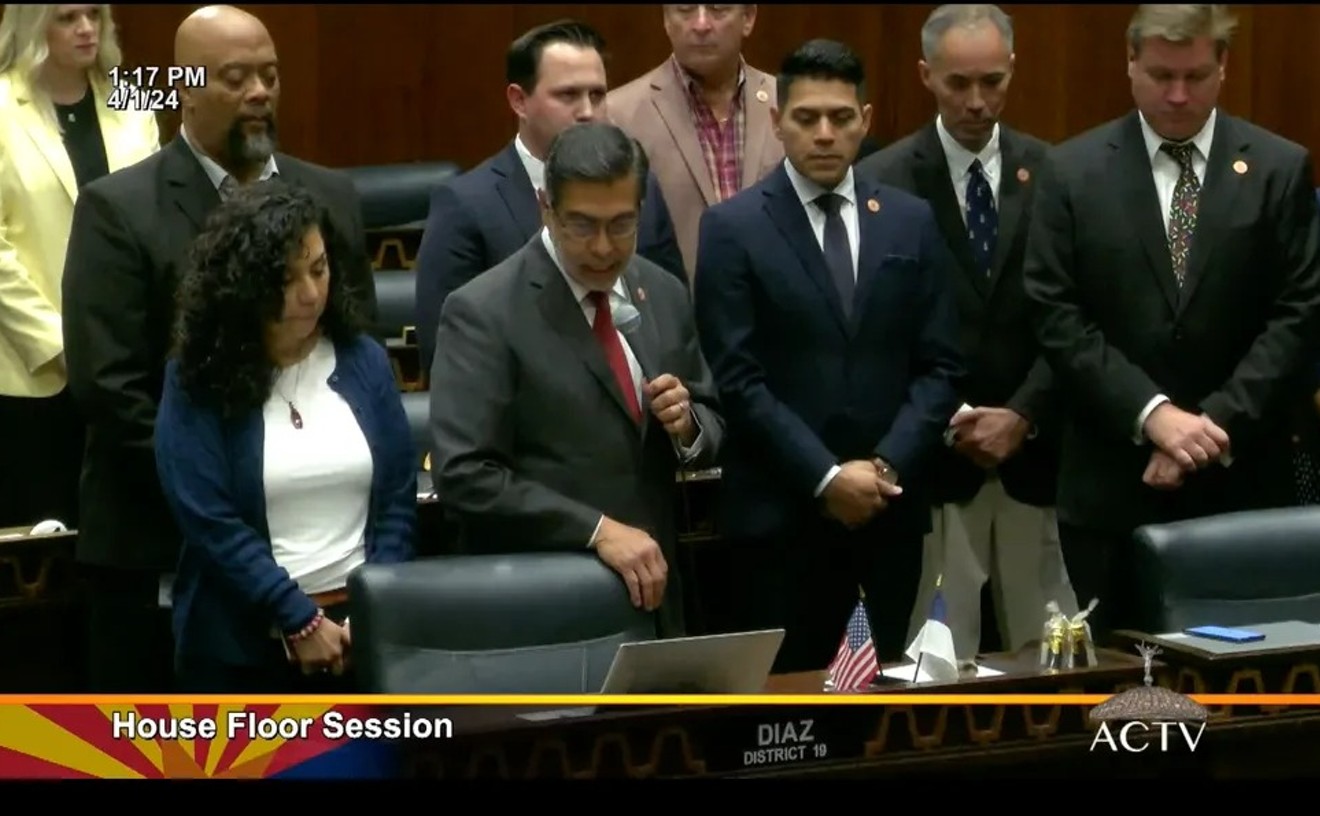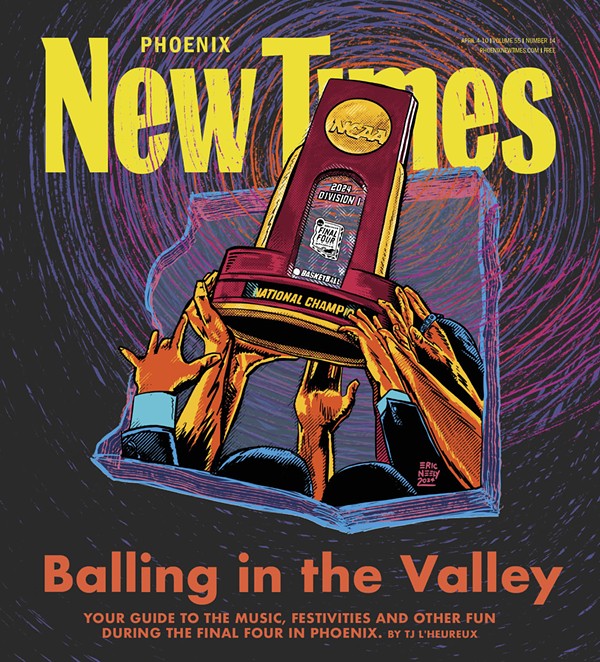"Ah, Phoenix," a New York contractor told a Valley colleague during a professional conference last year. "Nice place. But don't drink the water."
Phoenix's water system, it seems, is the talk of bored water and waste-water contractors everywhere. The Best Run City in the World is also the last major one in the country that still installs asbestos-cement pipe, according to Unibel, a pipe manufacturers' organization. In fact, "AC pipe" is no longer manufactured anywhere in the United States. To get a water-line installation contract from Phoenix, contractors must import AC pipe from Chihuahua, Mexico--from Mexalit Industreal S.A., the last company in North America that makes the stuff.
There are a few reasons American companies don't mess with AC pipe anymore. After World War II, asbestos was the most widely used water pipe in the country, both because of its strength and its low cost compared with the other widely used material, ductile iron. In the 1980s, however, as asbestos-related health concerns came to light, cities began phasing out AC pipe. In 1989 and 1990, the Environmental Protection Agency considered a ban on its use in potable water systems, finally electing to prohibit its manufacture starting in 1996 (a moot point, since none is manufactured here anymore). Today, AC pipe is slightly more expensive than newer polyvinylchloride (PVC) pipe, and is still much less expensive than ductile iron.
Asbestos has long been classified as a class-one carcinogen. Although no definitive link between asbestos and digestive-system cancers has ever been proved, a 1984 National Toxicology Program study suggested that there is a slightly increased risk of digestive and kidney cancers when the material is ingested. Despite the lack of absolute proof, the EPA has, since 1991, considered asbestos contamination from AC pipe a serious enough health threat to require that drinking water be monitored for it. That year, Phoenix tested 15 sites for asbestos in the drinking water, and 11 were negative. The other four contained levels far lower than the EPA maximum, and a retest is not required until the year 2000, says Mario Saldamando, assistant director of the Phoenix Department of Water Services.
There are also Occupational Safety and Health Administration regulations for handling the pipe; they are designed to protect workers from exposure to asbestos fibers. One rule is that the pipe is not to be cut in the field with power equipment--although several contractors interviewed for this story admitted that they do it all the time. Another regulation requires that scraps and unused sections of pipe be disposed of in sealed hazardous-waste containers, in designated hazardous-waste landfills. Disposal of old asbestos pipe that has been taken from the ground costs Phoenix about $45,000 per year.
Companies wishing to manufacture products containing asbestos also face liability-insurance nightmares. Two of the last American companies to make AC pipe were CertainTeed, headquartered in Valley Forge, Pennsylvania, and Capco, in Van Buren, Arkansas. Both stopped producing AC pipe in part because of their skyrocketing insurance premiums, and are now manufacturing PVC pipe. Mexican law does not require Mexalit to carry such insurance.
Finally, demand for AC pipe has plummeted because almost nobody uses it. Almost nobody, that is, except Phoenix.
Saldamando says concerns about the pipe are overblown, and that the cities of Mesa, Scottsdale and Glendale also use it. He says that last spring, the city hired the civil engineering firm Black and Veatch to do a study on the feasibility of using PVC pipe. The city says that its source water tends to be very warm, and PVC pipe can lose its pressure-worthiness at higher temperatures. The study should be completed in November.
Despite Saldamando's assertion, Scottsdale and Glendale do not use AC pipe anymore. Dave Petty, Scottsdale water and waste-water distribution manager, says that asbestos pipe is still approved for use in his city, but that no one is using it anymore because PVC pipe is cheaper and easier to work with. He says that Scottsdale has experienced some failures in its PVC mains, but not many. Jim Taylor, director of utilities for Glendale, says the same thing. Randy Brown, the engineering plans examiner for Mesa, says that his city has never approved PVC pipe for use in its water system.
Saldamando says AC pipes pose no threat to the health of Phoenicians. For one thing, the city's water is alkaline, not acidic. As in teapots all over the Valley, mineral deposits gradually build up on the inside of the system, so eventually, water doesn't touch the pipes, anyway. Water in the eastern part of the nation is more acidic, and has a tendency to slowly dissolve the cement in such pipes, releasing the asbestos fibers.
Some Valley contractors would be thrilled to switch from AC pipe to some other type, regardless of health concerns. They point to the added time and expense of working with and disposing of the stuff, and also say that since they aren't supposed to cut it in the field, it has to come in different lengths than would plastic or iron pipes. They also must use more expensive joints and valves with AC pipe.
More problems with the pipe used in Phoenix can be attributed to quality-control shortcomings at the factory in Mexico. Although the city says it has no record of quality problems with the imported pipe, Mexalit's spotty delivery and production practices have led one local distributor, Dana Kepner of Tempe, to stop carrying AC products completely--and suffer the corresponding loss of Valley business.
"I just got tired of the headaches," says Rex Beavers, vice president of Dana Kepner. "AC pipe was a good material when it was being manufactured in the United States, but the Mexicans don't make it right."
Beavers says that the high cost of asbestos fibers in Mexico probably leads the company to substitute other materials as fillers. That means that the pipe can't hold as much pressure as it needs to.
Francisco Vicke, the director of Mexalit, denies that there have ever been quality problems with his AC pipe, and says that his product is as strong and durable as that which used to be made in the U.S.
Dallas Peterson, the president of Sahuaro Contracting Inc. of Mesa, says that asbestos cement is a porous material, and needs special handling after it is installed. Otherwise, it will break. "We keep it under [lower] pressure for a couple weeks after we put it in, and that seems to work okay," he says. He wishes, however, that Phoenix would switch to PVC in both its potable and waste-water applications. Currently, the city uses clay pipe for waste water.
"I can't understand it," he says. "PVC sewer [pipe] is the state of the art, and it has been for about ten years, but the city still insists on using clay." He says that clay is much heavier, more expensive and labor-intensive to install, and that Phoenix is the only city in the Valley that still uses it. Everybody else has switched to PVC.
Saldamando says Phoenix prefers clay pipe in its waste-water system because it is durable and long-lasting. "We have sections of that pipe in our system that are 90 years old," he says. "We want to just put it in the ground and forget about it.










